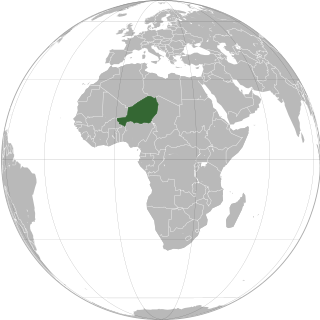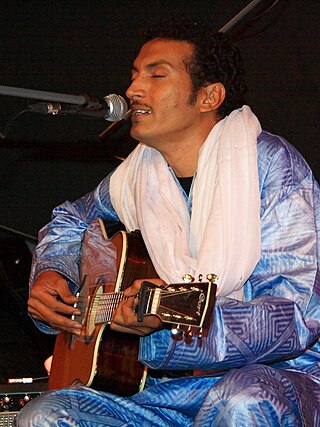Related Research Articles

Niger or the Niger, officially the Republic of the Niger, is a landlocked country in West Africa. It is a unitary state bordered by Libya to the northeast, Chad to the east, Nigeria to the south, Benin and Burkina Faso to the southwest, Mali to the west, and Algeria to the northwest. It covers a land area of almost 1,270,000 km2 (490,000 sq mi), making it the largest landlocked country in West Africa. Over 80% of its land area lies in the Sahara. Its predominantly Muslim population of about 25 million live mostly in clusters in the south and west of the country. The capital Niamey is located in Niger's southwest corner.

The Tuareg people are a large Berber ethnic group that principally inhabit the Sahara in a vast area stretching from far southwestern Libya to southern Algeria, Niger, Mali, and Burkina Faso. Traditionally nomadic pastoralists, small groups of Tuareg are also found in northern Nigeria.

Jane Wyman was an American actress. She received an Academy Award, three Golden Globe Awards and nominations for two Primetime Emmy Awards.

The music of Niger has developed from the musical traditions of a mix of ethnic groups; Hausa, the Zarma-Songhai, Tuareg, Fula Kanuri, Toubou, Diffa Arabs and Gurma and the Boudouma from Lac Chad.

Agadez, formerly spelled Agadès, is the fifth largest city in Niger, with a population of 110,497 based on the 2012 census. The capital of Agadez Region, it lies in the Sahara desert, and is also the capital of Aïr, one of the traditional Tuareg–Berber federations. The historic centre of the town has been designated a World Heritage Site by UNESCO.

The culture of Niger is marked by variation, evidence of the cultural crossroads which French colonialism formed into a unified state from the beginning of the 20th century. What is now Niger was created from four distinct cultural areas in the pre-colonial era: the Djerma dominated Niger River valley in the southwest; the northern periphery of Hausaland, made mostly of those states which had resisted the Sokoto Caliphate, and ranged along the long southern border with Nigeria; the Lake Chad basin and Kaouar in the far east, populated by Kanuri farmers and Toubou pastoralists who had once been part of the Kanem-Bornu Empire; and the Tuareg nomads of the Aïr Mountains and Saharan desert in the vast north. Each of these communities, along with smaller ethnic groups like the pastoral Wodaabe Fula, brought their own cultural traditions to the new state of Niger.

The Edinburgh International Film Festival (EIFF), established in 1947, in is the world's oldest continually running film festival. EIFF presents both UK and international films, in all genres and lengths. It also presents themed retrospectives and other specialized programming strands.

Agadez Region is one of the seven regions of Niger. At 667,799 square kilometres (257,839 sq mi), it covers more than half of Niger's land area, and is the largest region in the country, as well as the largest African state subdivision. The capital of the department is Agadez.


Gwendolyn Audrey Foster is an experimental filmmaker, artist and author. She is Willa Cather Professor Emerita in Film Studies. Her work has focused on gender, race, ecofeminism, queer sexuality, eco-theory, and class studies. From 1999 through the end of 2014, she was co-editor along with Wheeler Winston Dixon of the Quarterly Review of Film and Video. In 2016, she was named Willa Cather Endowed Professor of English at the University of Nebraska at Lincoln and took early retirement in 2020.

The BFI London Film Festival is an annual film festival held in London, England in collaboration with the British Film Institute. The festival runs for two weeks in October every year. In 2016, the BFI estimated that around 240 feature films and 150 short films from more than 70 countries are screened at the festival each year.

Iferouane, also spelled Iferouan, is an oasis town and commune in northern Niger, in Agadez Department. It is located northeast of Arlit in the northern Aïr, in the Ighazar valley near the Tamgak Range.
The Cinema of Niger began in the 1940s with the ethnographical documentary of French director Jean Rouch, before growing to become one of the most active national film cultures in Francophone Africa in the 1960s-70s with the work of filmmakers such as Oumarou Ganda, Moustapha Alassane and Gatta Abdourahamne. The industry has slowed somewhat since the 1980s, though films continue to be made in the country, with notable directors of recent decades including Mahamane Bakabe, Inoussa Ousseini, Mariama Hima, Moustapha Diop and Rahmatou Keïta. Unlike neighbouring Nigeria, with its thriving Hausa and English-language film industries, most Nigerien films are made in French with Francophone countries as their major market, whilst action and light entertainment films from Nigeria or dubbed western films fill most Nigerien theatres.

Tishoumaren or assouf, internationally known as desert blues, is a style of music from the Sahara region of northern and west Africa. Critics describe the music as a fusion of blues and rock music with Tuareg, Malian or North African music. Various other terms are used to describe it including desert rock, Saharan rock, Takamba, Mali blues, Tuareg rock or simply "guitar music". The style has been pioneered by Tuareg musicians in the Sahara region, particularly in Mali, Niger, Libya, Western Sahara, Algeria, Burkina Faso and others.

Omara "Bombino" Moctar is a Tuareg singer-songwriter and guitarist from Niger. His music is sung in Tamasheq and often addresses Tuareg geopolitical concerns. Bombino is the subject of the documentary film Agadez, the Music and the Rebellion.

Mahamadou Souleymane, known professionally as Mdou Moctar, is a Tuareg songwriter and musician based in Agadez, Niger, who performs modern rock music inspired by Tuareg guitar music. His music first gained attention through a trading network of mobile phones and memory cards in West Africa. He sings in the Tamasheq language. Moctar's fourth album, Ilana: The Creator, released in 2019, was the first to feature a full band. He plays guitar in the takamba and assouf styles.

Les Filles de Illighadad are a Tuareg band founded by Fatou Seidi Ghali in Illighadad, a village in the Sahara Desert in Niger. Ghali, it is claimed, is the first Tuareg woman to play guitar professionally.

Akounak Tedalat Taha Tazoughai,, is a 2015 Niger drama musical film directed by Christopher Kirkley and co–produced by Sahel Sounds, L'Improbable and Tenere Films. It is the world's first Tuareg-language fiction film. The film is based on the real life incidents of famous musician Mdou Moctar.
Moussa Hamadou Djingarey is a Nigerien film director.

Abdallah Oumbadougou was a guitarist from Niger. He was one of the founders of the ishumar genre of the desert blues, a politicized, guitar-driven musical genre of the Kel Tamasheq people of North Africa's Sahel.
References
- ↑ "Agadez: The Music And The Rebellion: Film". The Guardian. 2014. Retrieved 6 October 2021.
- ↑ Rubin, Mike (17 May 2018). "How Bombino Became the Sultan of Shred (Published 2018)". The New York Times .
- ↑ Kermeliotis, Teo; Ellis, Jessica (13 June 2012). "Omara 'Bombino' Moctar: Guitar hero of the desert". CNN.
- ↑ "NH Film Festival to screen documentary on Niger people". Fosters Daily Democrat. 13 October 2010. Retrieved 11 October 2021.
- ↑ "Agadez, the Music and the Rebellion". Rotten Tomatoes . Retrieved 6 October 2021.
- ↑ "'Agadez, the Music and the Rebellion,' to screen in Portsmouth". Fosters Daily Democrat. Retrieved 6 October 2021.